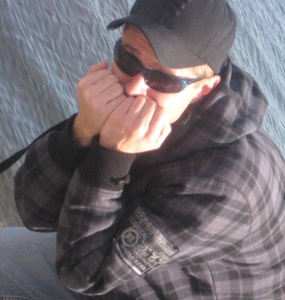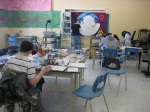Exactly What is a ‘Social Justice Focus?’
About two months ago, and a week into ECMP 355, I knew I needed to have my own personal tech advisor. Or, at least I had thought I needed to. I found Jeremy Schubert, (don’t google him) a tech type from Alberta. Anyway, as Jeremy and I were exchanging emails about setting up my blog, he asked about the Middle Years program, to which I

replied, it had a ‘social justice focus.’
Jeremy asked, “Exactly what is a social justice focus?”

Wow. A good question. In fact, I thought it was such a good question I decided to ask my peers and post the copious replies that I was certain would fill my inbox. So, I sent out emails to all the post-interns (now, by the way, all individuals with shiny new teaching certificates, and many with teaching contracts) and to the upcoming interns, asking what their take was on our program’s social justice focus. I had one response.
Chris McCullum is an intern and a clever, level headed guy. He’s the kind of fellow who goes home to help with the family farm and gets teased a lot for it, who is a self-declared-I-don’t-read-books-kind of guy, but a person who knows more about current events than anyone I know. He was our go-to-guy at university for anything going on around the world, and his social studies lessons knocked my socks off. He’s a CBC listener, and, I dare say, a more reliable source for history than Wikipedia.
Here’s Chris’s reply:
“I really don’t know what the party line is for social justice but for me it’s about teaching kids to think critically and be aware of other people and situations around the world. I’m not sure if that’s close but I really think that critical thinking is the key because then it’s not about indoctrinating kids to see things my way but rather to thinking things through, questioning, challenging and then coming to their own conclusions.” Chris McCullum, Thursday, May 21, 2009 12:54 PM
So what is the Faculty’s ‘party line’ on the social justice focus of my middle years program? Many of my instructors, and certainly my programs’ department head, Dr. Meredith Cherland, have offered this take,
“[T]eaching for social justice… here [at the Faculty of Education,] is both a process and a goal.
The goal for social justice is the full and equal participation of all groups in a society mutually shaped to meet their needs; this will require the equitable distribution of resources; a healthy natural environment and sustainable ways of living; and
Processes for working toward social justice are inclusive, participatory, and democratic; they affirm human agency, and encourage a sense of collective responsibility for the good of the whole.” Adams, M., L.A. Bell, & P. Griffin (Eds.) (2007) Teaching for diversity and social justice, second edition. New York: Routledge.
Yet, in her own courses, staying closer to her own party line, Dr. Cherland also offered the following quotes to help her middle years students shape our emerging understanding of teaching for social justice.
“The voices of indignation and protest have resounded through the years in response to injustice and human suffering…social justice is a concept contingent on particular historical circumstances. It does not exist in some supersensible realm, anymore than in the minds and souls of individual human beings.” Maxine Greene. 1998. Introduction. In W. Ayers, J.A. Hunt, & T. Quinn (Eds.), Teaching for social justice. New York: The New Press.
“The struggle for social justice is nothing less than the struggle for a reduction of human pain and suffering.” Franklin, U. (1999a) Address to the “Made to Measure” National Symposium on Designing Research, Policy and Action Approaches to Eliminate Gender Inequity. Halifax, Nova Scotia. October 1999.
I have emerged from my Middle Years program with the understanding that teaching for social justice is about empathy, critique, hope and action. But, these words are trite, easily recited, yet must be more than goal and process, or teaching. I believe, like a belief system, to teach for social justice, it must first be a lived practice.
At the end of April I reflected on my university experiences and my emerging perspectives on teaching and learning in an article I wrote titled The Absolutely True Ramblings of a Reduced Course Load Almost Intern. In the article I reflected that:
“I did not sit idle; I stayed true to being critical, and to being engaged in the teaching learning process and to believing in equity. I’ve learned that there is no authentic social justice in the environment of learning, whether that be the learning environments of my past, the one I’m in now, or probably not the ones in which I’ll be part and this saddens me. Learning is so cloaked in privilege and power.” Cori Saas, April 15, 2009, EPS 390
 Was I too harsh? Too pessimistic? No, I know how I ended my piece, and I know I a
Was I too harsh? Too pessimistic? No, I know how I ended my piece, and I know I a m an eternal optimist (though, you likely can’t believe that now). I believe in kids, I believe in difference making, and learning. Yes, that’s my hope for living a social justice lens, an unshakeable belief in kids and an unshakable belief in difference making and an unshakable belief in learning.
m an eternal optimist (though, you likely can’t believe that now). I believe in kids, I believe in difference making, and learning. Yes, that’s my hope for living a social justice lens, an unshakeable belief in kids and an unshakable belief in difference making and an unshakable belief in learning.
Now, like Jeremy, I want to know, what exactly is your understanding of a social justice focus?
